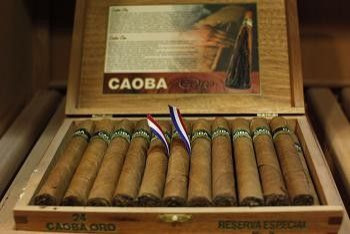Cuban Cigar Imports Legalized Under Deal With US, But With Restrictions

Hand-rolled Cuban cigars have long been considered the best in the world, but for decades they have been illegal in the U.S. due to an embargo against goods from the Communist nation. That will all change under a new deal to normalize relations between the two countries announced Wednesday by Presidents Barack Obama and Raul Castro.
That means that Americans will finally be able to enjoy fine Cuban-made Cohiba, Romeo Y Julieta and Montecristo -- a favorite of Cuban revolutionary Che Guevara -- stogies in the comfort of their home-smoking lounges for the first time since 1959, when the embargo was instituted in the wake of the Cuban revolution led by Fidel Castro.
The opening of the floodgates to "cigarros Cubanos" is going to be a great thing for the cigar aficionados of the world, Christopher Bledsoe, president and owner of International Cigar Experts, an online cigar retailer based in Poughkeepsie, New York, said.
“It’s going to be really booming, because it’s something that people have wanted for so long and now they actually have that right to import them. It’s going to be massive, massive business,” Bledsoe said Wednesday. “It’s just like for all of a person’s life they couldn’t have this one thing and now they can have it.”
That sentiment is shared by Rob Norris, CEO of cigar retailer JR Cigar, but he said he wasn't sure when Americans will actually be able to get their hands on the most legendary cigars in the world.
"It will be fantastic, obviously," Norris told CNBC shortly before the lifting of the embargo was announced. "Who knows what the news will be or how long it will take to take place, but that would be very exciting."
But there is a catch. U.S. travelers to Cuba will only be allowed to legally bring $400 worth of goods, and only $100 worth of alcohol and tobacco combined, back to the states. That severely limits the ability for consumers to stock their humidors with Cubans, and retailers face an adjustment process as they figure out exactly what the new paradigm for U.S.-Cuba relations will mean for their businesses.
“It does bring about a plethora of questions that we’ll have to make sure we sort out with our lawyers,” Bledsoe said. “It’s $400 of imports but only $100 worth of tobacco or alcohol. I assume we can only advertise Cuban cigars of $100 value or less. That’s my first inquiry to my lawyer … but as long as the legal highway is totally clear, we will definitely embrace this world.”
While cigar lovers across America are likely cracking open the champagne and logging into www.kayak.com to begin planning Havana vacations as a result the lifting on travel restrictions, there may be a downside, as well.
“There might be a rise in counterfeit Cubans just because of the fact that these are something that are going to be desired,” Bledsoe said.
But he doesn’t believe that such concerns will have a major impact on the market. “One thing I’ve noticed in the cigar world is that cigar makers will not sacrifice the integrity of their curing processes, so I don’t think we are going to see a lot of bad Cuban cigars,” Bledsoe added.
© Copyright IBTimes 2024. All rights reserved.





















